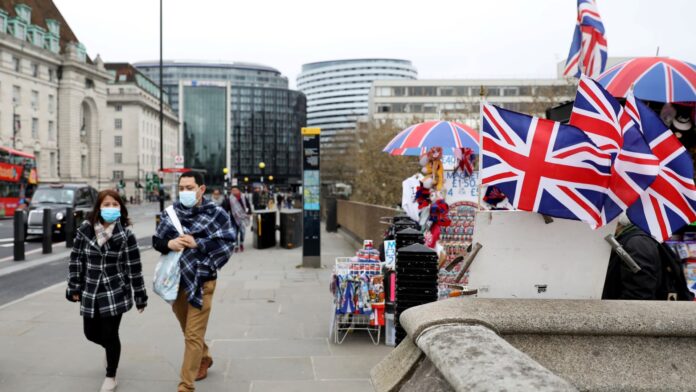A total of 1,739,700 people tested positive for the virus in the week to June 18, new estimates from the U.K.’s Office for National Statistics (ONS) have shown.
Xinhua News Agency | Xinhua News Agency | Getty Images
LONDON — U.K. Covid-19 cases are on the rise again, according to new data, which points to an increase in infections following the Queen’s Platinum Jubilee celebrations.
A total of 1,739,700 people tested positive for the virus in the week to June 18, estimates from the U.K.’s Office for National Statistics showed Friday.
That figure is up 75% from two weeks prior, before Brits celebrated the Queen’s 70th anniversary on the throne with a long weekend of street parties and social gatherings.
The uptick comes as the U.K.’s Health Security Agency said Friday that the latest technical data suggests two new Omicron variants — BA.4 and BA.5 — have become dominant in the U.K. and are driving recent increase in infections.
The two variants now make up more than half of new Covid cases in England, accounting for approximately 22% and 39% of cases, respectively.
“It is clear that the increasing prevalence of Omicron BA.4 and BA.5 are significantly increasing the case numbers we have observed in recent weeks,” the UKHSA’s chief medical advisor, professor Susan Hopkins, said Friday.
UKHSA’s latest analysis suggests BA.5 is growing 35.1% faster than the previously dominant BA.2, while BA.4 is growing around 19.1% faster. That suggests that BA.5 is likely to soon become the dominant Covid variant in the U.K.
Both variants were designated “variants of concern” in May, though scientists said there is currently no evidence to suggest either causes more serious illness than previous strains.
However, health experts reminded people to ensure their vaccinations are up-to-date and to continue following Covid-safe behavior. That includes staying at home if you have any respiratory symptoms or a fever and limiting contact with others until you are feeling better.
Some 20-25% of people in the U.K. currently remain unvaccinated.
“As prevalence increases, it’s more important than ever that we all remain alert, take precautions, and ensure that we’re up to date with COVID-19 vaccinations, which remain our best form of defense against the virus,” Hopkins said.
Cases and hospitalizations on the rise
Friday’s ONS data showed positive cases as a percentage of the community were highest in Scotland, where one in 20 people tested positive for the virus in the past week.
It was followed by Northern Ireland (one in 30), England (one in 40) and Wales (one in 45).
Overall, England reported the greatest number of cases at 1,360,600, followed by Scotland (250,700), Wales (68,500) and Northern Ireland (59,900).
Britain celebrated the Queen’s Platinum Jubilee with a four-day weekend from June 2 through 5.
Mike Kemp | In Pictures | Getty Images
The data, which is compiled by testing thousands of people from private U.K. households at random, whether or not they have symptoms, is thought to provide the clearest picture of Covid infections in Britain since free public testing was abandoned in England and Scotland.
Covid hospitalizations have also increased in line with community infections, rising 8.2% in England in the past week, according to UKHSA data.
“The pressure on the health system in terms of beds that are occupied is increasing,” Dr. Duncan Robertson, a member of the Indie Sage scientists collective, said during a briefing Friday.
Vaccinations continue to keep serious admissions and deaths at low levels, UKSHA said Friday. The intensive care unit and high dependency unit admission rate remained low at 0.2% over the same period.
However, Robertson warned against complacency, pointing to a slight spike in deaths in the week to June 18, and noting a potential distortion in reporting over the Jubilee public holiday.
“If you look at the data in terms of number of deaths reported, that has increased in the latest release, but that could be down to the Jubilee effects,” he said.


